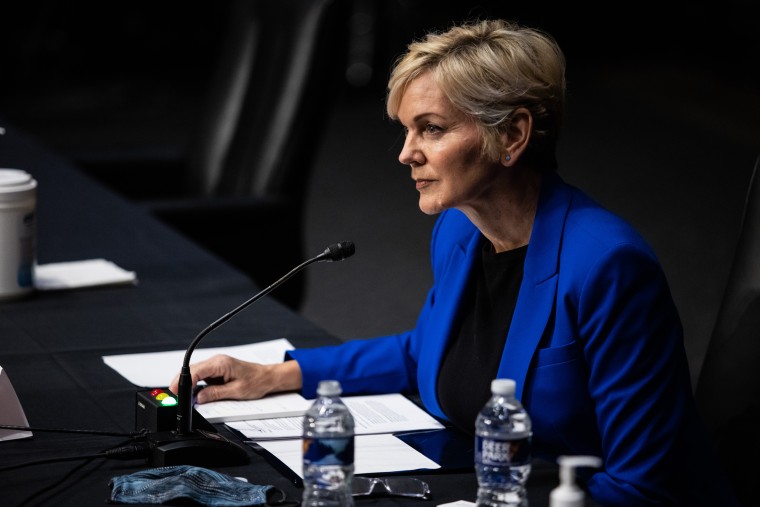President Joe Biden's massive infrastructure plan calls for hundreds of billions of dollars to retrofit millions of homes with new, energy-efficient appliances, something his administration says would create jobs and help save consumers money.
For that to happen, legislation will have to get through Congress. But Biden administration officials are also working behind the scenes to address a different impediment: roadblocks imposed by former President Donald Trump's administration they say greatly slow down the process of approving new energy efficiency standards.
The Energy Department has specifically targeted Trump-era changes to the process by which new or revised energy standards for all sorts of appliances and fixtures must go through.
It's a move leaders at the agency say could allow them to more quickly move such changes through the pipeline. They also argue the change will be key to ensuring the retrofits proposed under Biden's plan can be as economical and environmentally friendly as possible.
"The efficiency standards are a tremendously positive story about how standards can create enormous waves of innovation that helps people," Energy Secretary Jennifer Granholm told NBC News, calling her agency's move a "return to our ability to continuously improve."
The agency made notice last week of its proposed changes to what is known as the "process rule," which amounts to a set of steps that efficiency proposals must go through before they can be applied. The Biden administration says some changes to that process instituted by the Trump administration last year work to deliberately slow down the process of approving new regulations by a year or more, and it is hoping to have those barriers removed.
Agency officials who spoke with NBC News said the Energy Department should release a final ruling on the administration's proposed changes within the next two months.
Biden's proposed infrastructure plan sets aside $213 billion into building and boosting affordable housing units over the next eight years. Some of that would go to retrofitting these residences with new appliances and fixtures — which is part of why Energy officials say it's important to update the standards. The quicker those standards are refreshed, the sooner manufacturers can begin creating new products based on them — products that officials say would be used in those retrofits and new housing.
"Especially as the president is proposing to build and to retrofit more than 2 million homes and commercial buildings in the American Jobs Plan, strengthening efficiency standards that minimize energy usage gives us the best bang for our buck," Granholm said. "We'll be able to provide consumers with energy efficient products that save money and create jobs and protect the environment. It is a triple win."
Joe Vukovich, energy efficiency advocate at the Natural Resources Defense Council, in a statement called the effort "a critical, first step in repairing the damage done by the Trump administration to America’s most successful energy-saving program, which reduces harmful pollution and lowers household energy bills by an average of $500 every year."
"The ‘Process Rule’ for energy efficiency standards may sound like complicated jargon, but it has a huge impact on the energy-efficiency of the products and appliances we use every day," Vukovich said, noting his group sued over the changes made by the Trump administration last year.
"While NRDC is still reviewing the proposed rule, it is clear the revisions proposed by the Biden administration would erase the most harmful aspects of the Trump administration’s changes," Vukovich added. "This includes the arbitrary savings thresholds, as well as burdensome, one-size-fits-all requirements that risked needlessly grinding the program to a halt."
Devin Watkins, an attorney with the libertarian-aligned Competitive Enterprise Institute, said the Biden administration's proposed changes are "just the wrong way to go."
When the Trump administration first made alterations to the process rule last year, CEI praised the new interpretation as beneficial because it created a higher threshold for what could be considered "significant" savings generated by a new efficiency standard, which it must meet for approval.
Under that standard, about 40 percent of the rules already on the books to that point would not have been able to be enacted.
An Energy Department official told NBC News those changes forced binding requirements on the agency that were not mandated by law, adding the revisions are "rather inefficient to apply across the entire appliance standards program."
"So it would be reverted back to a more flexible approach that the agency had before," this person said of the agency's proposed changes. "It was tried and tested and all players including industry were fine with it. So we're just going back to our best practices."
When it comes to new or updated efficiency rules, at the front of the line for the agency are water-consuming appliance and bathroom-fixture standards that were loosened during the Trump administration — changes that took place after Trump's lengthy monologues about showers, dishwashers and toilets.
"It was an unusual obsession, I'll just say that," Granholm said.

